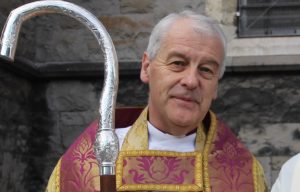
By Sarah Mac Donald - 15 February, 2020
 In the wake of last weekend’s general election and the recent election in Northern Ireland, Archbishop Michael Jackson has said he hopes a new road map of co-operation emerges and “captures the imagination of everyone” as democratic government begins afresh with new faces and new expectations.
In the wake of last weekend’s general election and the recent election in Northern Ireland, Archbishop Michael Jackson has said he hopes a new road map of co-operation emerges and “captures the imagination of everyone” as democratic government begins afresh with new faces and new expectations.
In a post-election reflection, the Church of Ireland Primate of Ireland noted how often in Scripture it is during the ‘in-between times’ that true transformation happens.
“Throughout history when the people of God are in transition, physically or politically, new things can happen because new perspectives cannot be avoided or sidestepped.”
He highlighted how across the whole of Ireland, new political things are happening. “New political work is being done. New futures are unfolding, tired structures are being revived.”
The Archbishop of Dublin and Glendalough continued, “The hope of all of us is that such fresh movement will benefit all who are in need of personal security in their own lives and opportunity to contribute in their life in the community.”
While this required economic stability and economic growth, he stressed that it is the use of wealth that drives a wholesome policy of government rather than wealth and productivity in and of itself.
Referring to last weekend’s general election, Dr Jackson said its outworking is still unfolding.
“Political parties of all hues are actively seeking ways not only to find the numbers required to form a Government but to build a society based on a generous sense of public duty and providing a tangible dividend for a broad range of people including the ‘squeezed middle’ and the marginalised and dispossessed.”
The Archbishop underlined that a yardstick of the integrity of any society historically has been how it cares for the poor, for minorities and for those at its margins.
Of the reestablishment of the Assembly in Stormont, he paid tribute to the many people who had worked hard to make this happen. “Without their commitment beyond the call of duty, we would not have the chances of shaping a fresh future that beckons us forward,” he stated.
The Archbishop also warned that the more normalised the housing crisis, the homelessness crisis and the hospital crisis become in the Republic of Ireland, “the more callous our carelessness becomes regarding those who have no voice and who have no purchase in our society.”
He said that while these matters became the headline issues during the election campaigns and need to remain central to the new world of government, there was also a profound cry heard regarding the deepening experience of disconnection and marginalisation. “It is now as acutely felt in rural Ireland as it is in urban Ireland,” he warned.
Elsewhere in his reflection, Dr Jackson said his prayer is for wisdom of decision and generosity of understanding on the part of those who will govern anew in the Republic of Ireland and on the part of those who govern afresh in Northern Ireland.
“The holding of public office is a unique opportunity to serve and to enhance the common good,” he said and added, “Peace is our gift in the light of the Belfast-Good Friday Agreement. Peace is our currency of co-operation locally and further afield. Politicians owe it to their citizens to ensure peace and to build flourishing societies.”
The Archbishop also noted that Dublin City University, through the Church of Ireland Centre, had produced the publication, ‘Praying Together – Prayers for Primary School Assemblies’, which was edited by Jacqui Wilkinson.
He quoted one of the prayers it contains, written by the Rt Revd Michael Burrows, saying it captures the hope that children and adults might share and speak for the whole of Ireland.
God of all nations
We pray for Ireland, this beautiful country.
Bless all who live here, wherever they come from.
Bless those who rule us, because they need our prayers.
Make our country a peaceful and happy place.
Help us to be proud of it, to play our part as young citizens,
And to make sure those who come after us can enjoy it too. Amen.